
I had noted that a few libraries in our system had bought some Warners’ DVD-Rs starring Peter Lorre, including a couple of films I have long wanted to see. So I checked through the system and ordered in whatever Lorre movies were available that I hadn’t seen yet. I really like Peter Lorre.
Somebody else had a hold on this, so I watched it first so I could return it and let them have it. Black Angel is a noir thriller starring Dan Dureya and June Vincent as the leads. Lorre gets third billing—and one of the three ‘photo’ introductions in the opening credits—but sadly (if predictably) doesn’t get nearly as much screentime as we’d all like. Also on hand are Broderick Crawford as (what else) a tough cop, although this one is surprisingly diligent and fair-minded as well. Wallace Ford, aka Babe Jensen / Hanson* in a couple of Universal’s mummy movies, has a small, rather nothing part.
[*As fans known, the character’s last name inexplicably changes between movies. Continuity!]Dureya plays Martin Blair, a boozehound obsessed with his no-good ex-wife, Mavis. He tries to get to her apartment to see her, but is blocked by the doorman. Mavis’ lover, Kirk Bennett, has less luck, though. He gets in, but discovers her dead on the floor. He flees but is seen and soon arrested for the crime. Convicted, and this being the ‘40s, he is quickly scheduled to be executed.
The only one who believes in Bennett’s innocence is his beleaguered wife, Catherine, who stands by him despite his cheating on her. She initially believes Martin might be guilty, but he has an air-tight alibi; he was passed out drunk and locked in his room for the night.
Martin, however, had seen a man ask for his wife right before she ended up dead. He assumed it was Bennett, but eventually learns it wasn’t. It was night club owner Lorre, and soon Martin and Catherine—she proves to be so good an amateur singer that I nearly burst out laughing the first time we hear her—are working undercover at the club, aiming to unearth the proof (in the form of a convenient broach) that Lorre is the real killer.
Needless to say, the movie starts to click more once Lorre makes the scene. That guy had screen charisma like nobody’s business. He was also a notorious camera hog, and it’s always amusing to watch his antics as he tries (nearly always successfully) to steal whatever scene he’s in. It must have driven his co-stars nuts, especially since he usually was stealing the picture from its nominal stars. Here, for instance, he plays one scene sprawled across the top of a bench. The guy was shameless.

Dureya and Vincent are pretty serviceable. They can’t really compete with Lorre, but they aren’t as brutally blown off the screen as, say, Robert Alda and Andrea King on The Beast With Five Fingers. Still, the film definitely pops more when Lorre or Broderick are onscreen.
The script seems like it’s going to be, again, serviceable and efficient. (Which, admittedly, would make it better than 90% of movie scripts today). However, the climax is actually quite clever. This is probably because the film was based on a novel by noir icon Cornell Woolrich. I was really pleasantly surprised by how things wrapped up, so that’s a big thumbs up for me.
Not a great film by any means, nor an essential watch, but if you like this sort of thing or just, like me, enjoy seeing Lorre strut his stuff, you might want to check this out.
